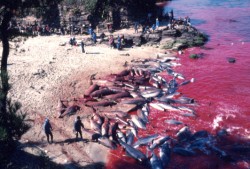
For most people of a certain age, our image of the cheerful, helpful and super intelligent bottlenose dolphin was formed by the iconic 1960s Flipper television series – a marine version of Lassie.
The show portrayed a wild dolphin who acted as a sidekick to a Florida marine park warden and his two young sons. Produced in cooperation with the Miami Seaquarium, all the TV dolphins were captured and trained by an ex-navy diver named Ric O’Barry.
But Flipper also ended up changing O’Barry’s life. In 1970, he made an about-face and began educating the public on the plight of captive dolphins, spending some time in the Bimini jail for trying to release a dolphin held at Alice Town’s now-defunct Lerner Marine Lab. For the last 40-plus years he has spoken out against dolphin capture at lectures and conferences around the world. In fact, he gave a talk in Nassau a few months ago.
O’Barry eventually hooked up with an activist group called the Sea Shepherd Conservation Society – founded in the 1970s by a former Greenpeace leader named Paul Watson. This group’s mission was “to intervene against illegal activities exploiting marine wildlife.” Sea Shepherd is known for its dramatic encounters with Japanese whaling ships in the Antarctic. And more recently it has helped expose the large-scale hunting of small cetaceans in Japanese coastal waters.
The annual slaughter of small cetaceans off Japan was virtually unknown until 2003, when O’Barry and a Sea Shepherd team were arrested for cutting nets to release dolphins captured in a drive hunt at the small port of Taiji in Japan. Their covertly obtained photos of the killing of hundreds of small whales and dolphins in a hidden cove made headlines around the world, causing the fishermen to erect barricades to hide the bloody slaughter from prying cameras.
O’Barry returned to Taiji every year to help end the drive hunts. A big turning point came in 2009, when he partnered with a Greek-American photographer and director named Louie Psihoyos. The result of this partnership was a powerful film which argued that the drive hunts are cruel, unnecessary and unsustainable. The Cove won worldwide acclaim and an Academy Award for best documentary feature.
So scores of earnest volunteers from around the world, styling themselves Cove Guardians, descend on Taiji every year. They spend two weeks at a time during the killing season, monitoring and documenting the entire hunt. And this year, two of those volunteers made their way from the Bahamas. Sheri Albury-Hubball and Melissa Maura are close friends and animal welfare advocates who became passionate about the drive hunts after watching The Cove three years ago.



